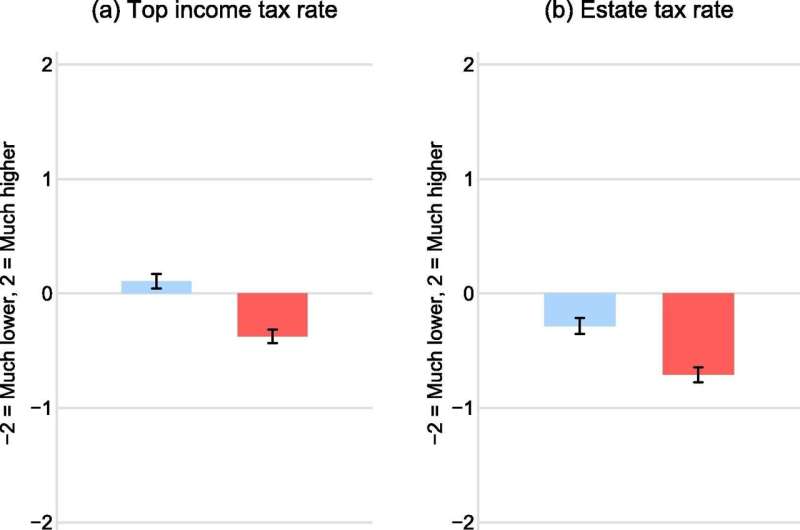This article has been reviewed according to Science X's editorial process and policies. Editors have highlighted the following attributes while ensuring the content's credibility:
fact-checked
peer-reviewed publication
trusted source
proofread
What the wealthy consider 'fair' may not be equal to others

Wealthy Americans have distinct preferences regarding fairness, with a greater willingness to accept inequalities relative to the general public, according to a new University of Michigan study.
The findings, which appear in the Journal of Public Economics, provide new insights into the reasons behind the wealthy opposing government redistribution.
In general, people have policy preferences based on how much they expect to benefit from them. For example, if a tax change means you would pay more taxes, then you might be against that policy change.
But unlike previous research that analyzed policy choices, the new study takes a different approach by showing that fairness preferences matter, too—at least in the context of redistribution, said Alain Cohn, U-M associate professor of information and the study's lead author.
Researchers collaborated with an online survey company that had national samples that included wealthy people. From December 2016 to April 2017, the sample included 465 individuals with income and wealth in the top 5%—an annual household income above $250,000 or gross liquid assets of at least $1 million—and 417 individuals from the general population. By determining the earnings distribution among workers who performed the same task, participants made choices that had real financial consequences for these workers.
The share of individuals who endorse a "libertarian fairness view," which means a greater tendency to accept inequality even if it's caused by (bad) luck, was more than twice as large among the top 5% income bracket.
"In other words, wealthy individuals are more likely to consider unequal incomes as fair even if the inequality arises from chance," he said.
In contrast, the remaining 95% are more likely to consider unequal incomes as unfair even if brought about by differences in effort—referred to as an "egalitarian fairness view," the study showed.
The measure of fairness preferences can explain up to one-third of the gap in tax attitudes between the wealthy and nonwealthy. Cohn said that the difference in fairness preferences also explains 45% of the voting gap between the wealthy and nonwealthy in the 2016 presidential election when former President Donald Trump promised tax breaks for the wealthy.
The study also found that individuals who self-report having climbed the income ladder through entrepreneurship or other means are more accepting of income inequality than those who have inherited their wealth. In addition, first-generation wealthy are also less supportive of government redistribution than others.
"These findings contradict the notion that individuals who have experienced upward mobility will be sympathetic to more equal income distributions given their humble beginnings," he said.
More information: Alain Cohn et al, Wealthy Americans and redistribution: The role of fairness preferences, Journal of Public Economics (2023). DOI: 10.1016/j.jpubeco.2023.104977
Journal information: Journal of Public Economics
Provided by University of Michigan





















